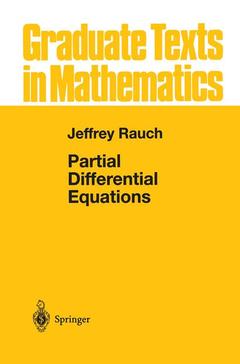Partial Differential Equations, 1st ed. 1991. Corr. 2nd printing 1997 Graduate Texts in Mathematics Series, Vol. 128
Langue : Anglais
Auteur : Rauch Jeffrey

This book is based on a course I have given five times at the University of Michigan, beginning in 1973. The aim is to present an introduction to a sampling of ideas, phenomena, and methods from the subject of partial differential equations that can be presented in one semester and requires no previous knowledge of differential equations. The problems, with hints and discussion, form an important and integral part of the course. In our department, students with a variety of specialties-notably differen tial geometry, numerical analysis, mathematical physics, complex analysis, physics, and partial differential equations-have a need for such a course. The goal of a one-term course forces the omission of many topics. Everyone, including me, can find fault with the selections that I have made. One of the things that makes partial differential equations difficult to learn is that it uses a wide variety of tools. In a short course, there is no time for the leisurely development of background material. Consequently, I suppose that the reader is trained in advanced calculus, real analysis, the rudiments of complex analysis, and the language offunctional analysis. Such a background is not unusual for the students mentioned above. Students missing one of the "essentials" can usually catch up simultaneously. A more difficult problem is what to do about the Theory of Distributions.
1 Power Series Methods.- §1.1. The Simplest Partial Differential Equation.- §1.2. The Initial Value Problem for Ordinary Differential Equations.- §1.3. Power Series and the Initial Value Problem for Partial Differential Equations.- §1.4. The Fully Nonlinear Cauchy—Kowaleskaya Theorem.- §1.5. Cauchy—Kowaleskaya with General Initial Surfaces.- §1.6. The Symbol of a Differential Operator.- §1.7. Holmgren’s Uniqueness Theorem.- §1.8. Fritz John’s Global Holmgren Theorem.- §1.9. Characteristics and Singular Solutions.- 2 Some Harmonic Analysis.- §2.1. The Schwartz Space $$\mathcal{J}({\mathbb{R}^d})$$.- §2.2. The Fourier Transform on $$\mathcal{J}({\mathbb{R}^d})$$.- §2.3. The Fourier Transform onLp$${\mathbb{R}^d}$$d):1 ?p?2.- §2.4. Tempered Distributions.- §2.5. Convolution in $$\mathcal{J}({\mathbb{R}^d})$$ and $$\mathcal{J}'({\mathbb{R}^d})$$.- §2.6. L2Derivatives and Sobolev Spaces.- 3 Solution of Initial Value Problems by Fourier Synthesis.- §3.1. Introduction.- §3.2. Schrödinger’s Equation.- §3.3. Solutions of Schrödinger’s Equation with Data in $$\mathcal{J}({\mathbb{R}^d})$$.- §3.4. Generalized Solutions of Schrödinger’s Equation.- §3.5. Alternate Characterizations of the Generalized Solution.- §3.6. Fourier Synthesis for the Heat Equation.- §3.7. Fourier Synthesis for the Wave Equation.- §3.8. Fourier Synthesis for the Cauchy—Riemann Operator.- §3.9. The Sideways Heat Equation and Null Solutions.- §3.10. The Hadamard—Petrowsky Dichotomy.- §3.11. Inhomogeneous Equations, Duhamel’s Principle.- 4 Propagators andx-Space Methods.- §4.1. Introduction.- §4.2. Solution Formulas in x Space.- §4.3. Applications of the Heat Propagator.- §4.4. Applications of the Schrödinger Propagator.- §4.5. The Wave Equation Propagator ford = 1.- §4.6. Rotation-Invariant Smooth Solutions of $${\square _{1 + 3}}\mu = 0$$.- §4.7. The Wave Equation Propagator ford =3.- §4.8. The Method of Descent.- §4.9. Radiation Problems.- 5 The Dirichlet Problem.- §5.1. Introduction.- §5.2. Dirichlet’s Principle.- §5.3. The Direct Method of the Calculus of Variations.- §5.4. Variations on the Theme.- §5.5.H1 the Dirichlet Boundary Condition.- §5.6. The Fredholm Alternative.- §5.7. Eigenfunctions and the Method of Separation of Variables.- §5.8. Tangential Regularity for the Dirichlet Problem.- §5.9. Standard Elliptic Regularity Theorems.- §5.10. Maximum Principles from Potential Theory.- §5.11. E. Hopf’s Strong Maximum Principles.- APPEND.- A Crash Course in Distribution Theory.- References.
Date de parution : 10-2012
Ouvrage de 266 p.
15.5x23.5 cm
Disponible chez l'éditeur (délai d'approvisionnement : 15 jours).
Prix indicatif 52,74 €
Ajouter au panierThème de Partial Differential Equations :
© 2024 LAVOISIER S.A.S.


